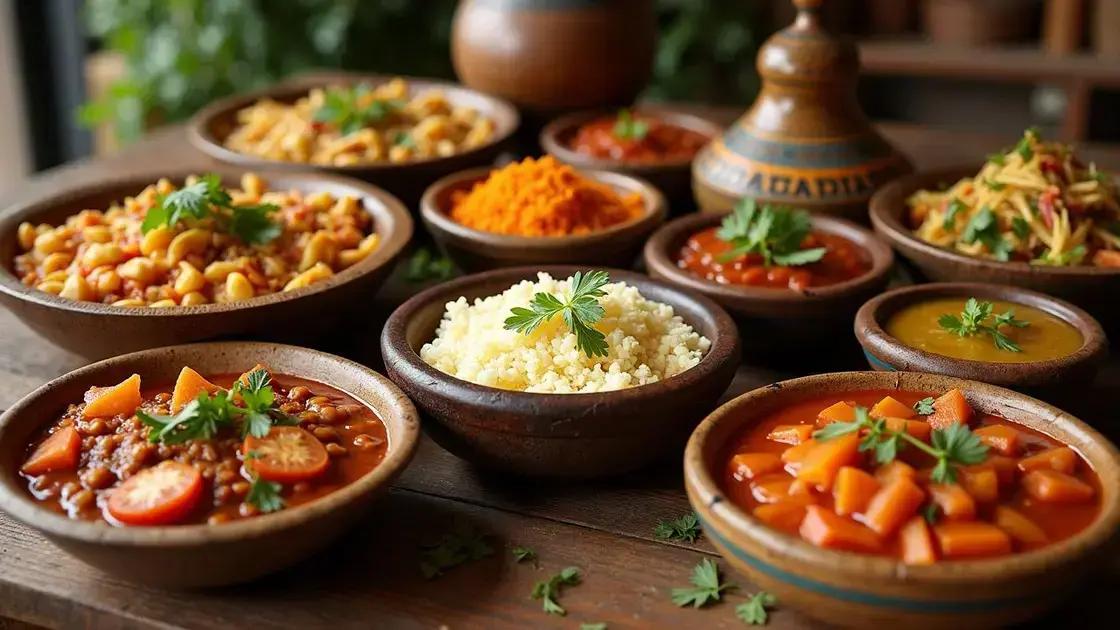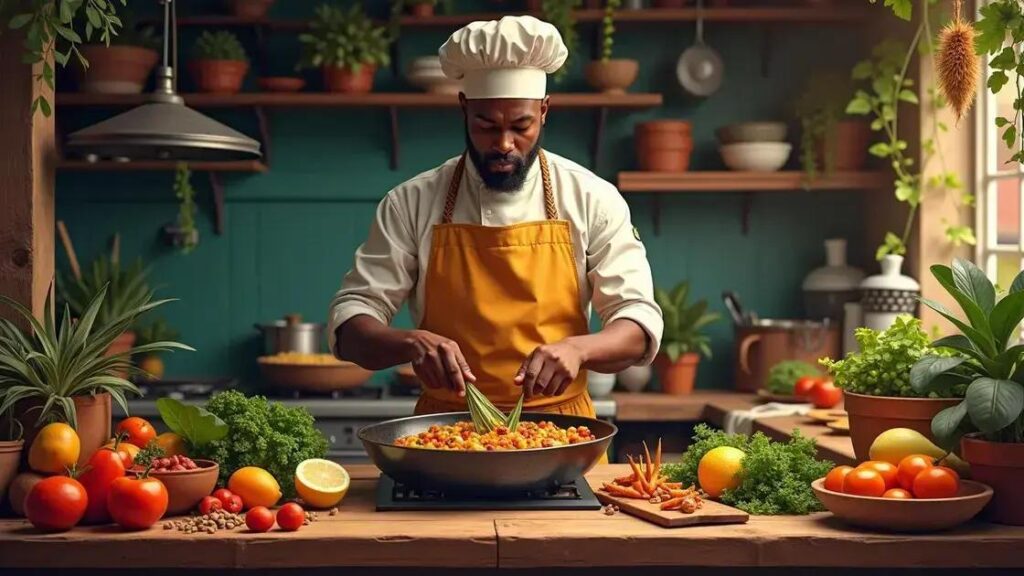Real testimonials about African recipes highlight the importance of authenticity, local ingredients, and traditional cooking methods, fostering community ties and preserving cultural heritage while inspiring culinary innovation.
Real testimonials about the African recipe reveal the rich flavors and traditions behind the continent’s diverse cuisine. Many who have tried these dishes often share their experiences, inspired by the authenticity and cultural significance tied to each recipe. In this article, we’ll delve into the authenticity in African recipes and explore how testimonials shape these culinary traditions.
Authenticity in African Recipes

Authenticity in African Recipes is essential to understanding the rich culinary heritage of the continent. Each meal tells a story, connecting people to their culture and history. Many African recipes have been passed down through generations, preserving time-honored techniques and ingredients that reflect the diverse environments of Africa.
Locally Sourced Ingredients
One key aspect of authenticity is the use of locally sourced ingredients. Farmers and local markets play a vital role in providing fresh produce, grains, and spices unique to each region. These ingredients not only enhance flavor but also maintain the traditional essence of dishes.
Traditional Cooking Methods
Authenticity is further emphasized by traditional cooking methods. Many African meals are prepared using techniques such as slow cooking, steaming, and grilling. These methods ensure that the flavors are deep and complex, making each recipe a delightful experience.
Regional Variations
Understanding regional variations adds depth to the authenticity of African recipes. Each area has its unique spin, influenced by local customs, available resources, and historical factors. For example, West African jollof rice differs greatly from its East African counterparts because of the different spices and cooking styles used.
Community and Sharing
Lastly, food in African culture is often about community and sharing. Meals are typically enjoyed together, fostering relationships and creating memories. Authentic African recipes encourage this communal aspect, making them more than just food, but a representation of togetherness.
How Testimonials Shape Culinary Traditions

How Testimonials Shape Culinary Traditions is an integral part of preserving cultural heritage. When people share their experiences with traditional African recipes, they pass on valuable information. These personal stories keep the history alive and connect new generations with their roots.
Influencing Dietary Habits
Testimonials from home cooks and chefs provide insight into why specific dishes are cherished. These words can influence dietary habits, encouraging others to try these authentic recipes. Personal experiences can make a recipe feel more relatable and appealing.
Building Community Through Food
Food has always been a way to bring people together. Sharing testimonials fosters a sense of community around cooking. When individuals hear about others’ success in making traditional African dishes, they are motivated to join in, creating bonds over shared meals.
Preserving Cultural Significance
Testimonials also help in preserving the cultural significance of recipes. They often highlight the stories behind the dishes, including their origins and meanings during events. This education keeps traditions alive and emphasizes their importance.
Encouraging Innovation
When people share their testimonials, it sparks innovation in cooking. Many chefs might make their own twists on traditional recipes based on these shared experiences. This blend of old and new creates a dynamic culinary scene that respects the past while evolving for the future.
Ultimately, testimonials enrich the culinary world. They bridge the gap between generations, keep traditions strong, and inspire new culinary ventures. Every shared experience helps create a richer narrative, making African recipes a vital part of cultural expression.
Embracing Authenticity and Community in Culinary Traditions
By focusing on the authenticity in African recipes and the impact of real testimonials, we strengthen our connection to cultural heritage. These rich culinary traditions not only nourish our bodies but also foster community and shared experiences.
The stories that emerge from personal testimonials are invaluable. They inspire us to explore and innovate within our cooking while honoring the past. Each dish carries a legacy, inviting everyone to partake in a vibrant cultural tapestry.
In conclusion, preserving these traditions through authentic cooking and sharing experiences ensures that they continue to thrive. By engaging with the culinary narratives surrounding African recipes, we can keep the spirit of the cuisine alive for generations to come.
FAQ – Frequently Asked Questions About African Recipes
What is the importance of authenticity in African recipes?
Authenticity ensures the preservation of traditional cooking methods and local ingredients, contributing to cultural heritage and enriching the culinary experience.
How do testimonials influence the cooking of African dishes?
Testimonials provide personal experiences that encourage others to try traditional dishes, fostering a sense of community and preserving cultural significance.
What role do local ingredients play in African cuisine?
Local ingredients enhance the flavors and authenticity of African recipes, connecting the dishes to their cultural roots and regional identities.
How can sharing food strengthen community ties?
Sharing meals encourages social interaction, promotes cultural exchange, and fosters connections among people, making food a vital aspect of community life.
What are some common cooking methods used in African recipes?
Common methods include slow cooking, steaming, and grilling, which help to develop rich flavors and maintain the authenticity of the dishes.
Why are personal stories about recipes important?
Personal stories provide context and meaning to the recipes, helping to preserve traditions and inspire future generations to engage with their culinary heritage.













